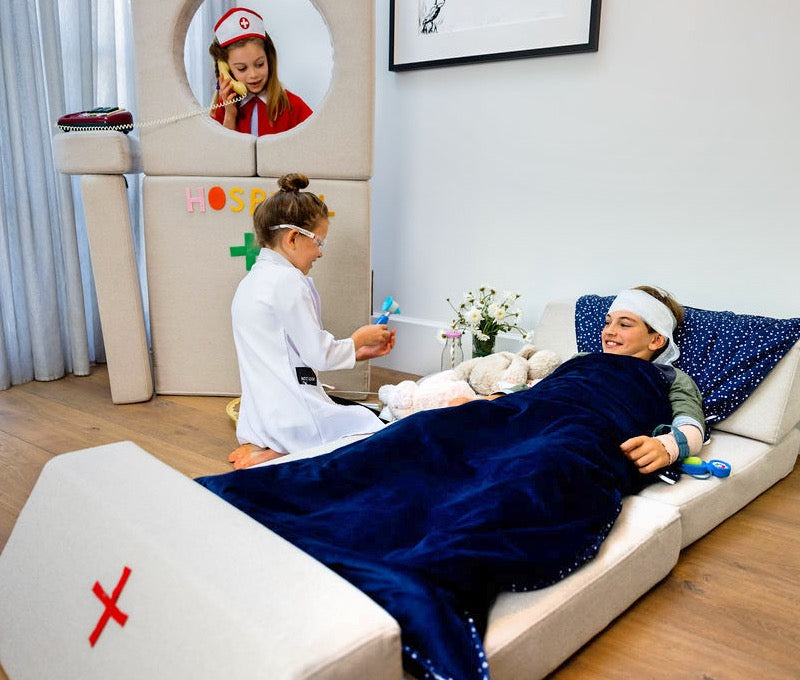In early childhood education, play has long been understood as a vital tool for children’s development and learning. Simply put, children learn through play.
Modular play furniture, like ARKi, provides life-sized building blocks of differing shapes and sizes that enables children to engage in both imaginative and constructive play, and therefore becomes a fantastic medium with which children are able to develop their play.

As children engage in imaginative play we see them develop:
- Abstract, symbolic thinking – children use gestures to symbolise objects, actions and behaviours (such as driving a car, or using their hand as a phone). Children also use objects to symbolise and ‘stand for’ something else (such as use of a stick to represent a horse, to a wand or a sword). The understanding of symbolic representation is transferrable to drawings and written words where letters and numbers are symbolic representations of verbal language.
- Language skills – children use different language and intonations to represent the various roles in their play such as mums, dads, babies or teachers. Children expand their language to explain their play and develop narratives. They understand concepts such as imagination and pretend which we see when they step in and out of their play scenario “pretend you are the mum, and this is the phone”.
- Social skills - as children play together they develop strong social skills such as negotiation, turn taking and perspective taking. When engaging in a play scenario children need to develop and agree upon rules (such as who plays which role, what each object represents etc). Children will learn to listen to others, compromise, take turns and understand others perspectives.
- Problem solving, reasoning and critical thinking – children’s play often involves facing problems that need actions to fix, as children encounter these they will develop problem solving skills, critical thinking and reasoning.

- Motor skills – fine and gross motor skills involved to manipulate blocks of various sizes encourages children to build muscle skills which are needed for formal fine motor skills such as cutting and writing as well as gross motor skills necessary for sport and gross body movements. Physical engagement with blocks also promotes hand-eye coordination as children explore lifting, moving and building with the blocks.
- Patience and focus – as constructions fall and need rebuilding children develop patience to start over and focus to try new approaches. This also often results in increased concentration and attention spans in children as they have an intrinsic motivation to play.
- Mathematic and spatial skills – construction involves mathematical concepts including but not limited to balance, 3D objects, distance, height, weight, gravity and spatial awareness.
- Scientific skills – problem solving, reasoning and thinking skills encourage deeper connections to scientific thinking skills of hypothesising, experimentation and cause and effect.
- Creativity and imagination – as building blocks are considered ‘loose parts play’ where there are unlimited possibilities for use, children are able to combine and recombine the blocks in a range of ways. By adding additional resources such as blankets or puppets etc, the avenues for creativity and imagination can be extended.
An important element of encouraging children’s play is to allow unlimited and unstructured freedom. This enables children to discover the depths of their imagination and come up with unique and different ways of exploring their world. Unstructured play allows children to create with freedom and explore their own capabilities and thinking. This may result in some ‘failures’ but with failure comes learning, solutions and new ideas. This type of play also builds confidence and creativity in children as well as enhancing their self-esteem as they create something new and unique.
How can you support your children’s engagement with ARKi modular play furniture?
- As loose parts play and unstructured play encourages freedom, creativity and independence in imagination, the ARKi modular furniture will not come with instructions on how to build a pirate ship, or puppet show, but rather it comes with the unlimited possibilities for your child’s imagination. It encourages you to allow your children to explore the limits of their imagination without the constraints of instructions.
- Take notice of your children’s play, try to provide additional resources to take their play further and enhance their pretend play. Additional resources can be as simple as blankets, and open-ended materials that have no predetermined use.
- Allow your children to take risks. ARKi modular furniture is designed with safety in mind. This means your children can explore balance without the risk of injury or damage. Encourage your children to have a go and take risks. Encourage them to keep trying if things don’t work out.
- If you enter the play world with your children, let them take the reins. As adults it is difficult not to take over, but it is important for your child to be the leader in their play. Ask questions rather than providing answers.
References:
Goncu, A., Vadeboncoeur, J. A. (2015). Expanding the definitional criteria for imaginative play: contributions of sociocultural perspectives. Learn Behaviour, 45, 422-431
Stone, S. J., & Burriss, K. G. (2016). A case for symbolic play: An important foundation for literacy development. The International Journal of Holistic Early Learning and Development, 3, 59-72.
Van Hoorn, J, Monighan Nourot, P., Scales, B., & Rodriguez Alward, K. (2015). Play as the cornerstone of development: The literature. In Play at the centre of the curriculum (6th ed.) (57-78pp.) USA: Pearson Education Inc.

